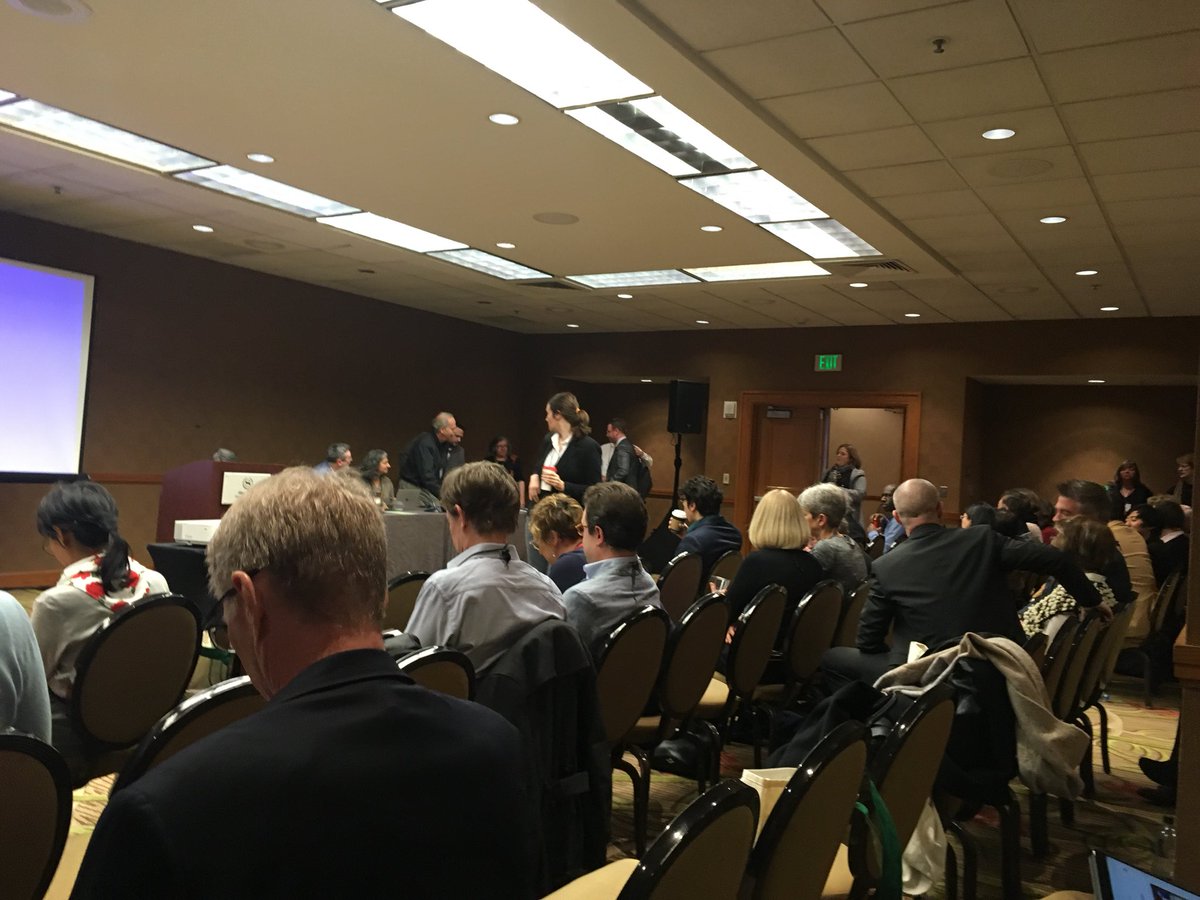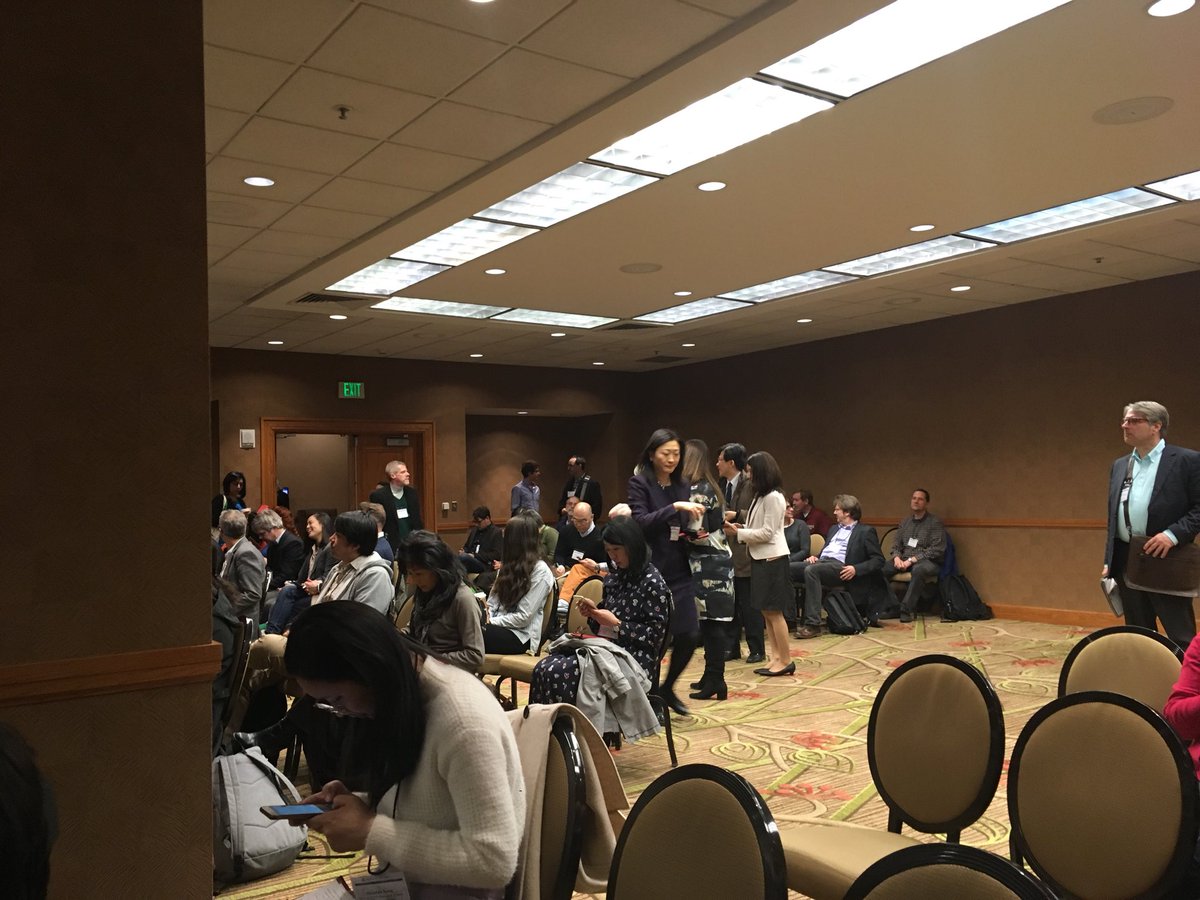A full house for the “The Death of Japanese Studies” panel even 5 minutes before it begins. Is our field in a state of crisis?  https://abs.twimg.com/emoji/v2/... draggable="false" alt="💀" title="Skull" aria-label="Emoji: Skull"> #AAS2019
https://abs.twimg.com/emoji/v2/... draggable="false" alt="💀" title="Skull" aria-label="Emoji: Skull"> #AAS2019
Organized by John Treat (Yale) and chaired by Karen Nakamura (Berkeley), discussants on this roundtable include Vera Mackie (U of Wollongong, Brian Dowdle (U of Montana), Joshua Fogel (York Uni), Stefano Romagnoli (Sapienza U of Rome, Italy, & Davinder Bhowmik (U of Washington).
Romagnoli showing a slide of scholars by group of disciplines in Europe-- lowest number is Japanese and Korean Languages and Lit (43), with the highest being English and Anglo-American Studies (564). (!)
African and Asian Studies often lumped together, he says, and discrimination happens at the institutional level in recruitment policies. The concept of "area studies" also causes a fracture, separating it from disciplinary studies like lit, history, anthro, etc.
Now hearing from Bhowmik. She says we& #39;re not necessarily despairing about the state of our field, but the challenges demand attention. The concept of "the field" is/has been also problematic- places like Okinawa were not always included, and presenting subfields is difficult.
Should we bother with the nation state anymore? she asks. There are arguments that much of what we work on is global in its scale, or thematic in approach. Yet we still end up heavily rooted in the modern nation state conception.
Despite the fears/realities that Japan Studies is dying, depts shrinking, & struggling to create/maintain faculty positions, it& #39;s not irrelevant or gone. Experiences teaching prove that Japan still remains a vital means through which to understand the complexities of our world.
Fogel, talking on Canadian Japanese Studies-- resources, including people, are fewer than in the US. There& #39;s few places where a degree in Japanese Studies will result in a job for that.
In 2011, the average age of Japan specialists was 57 years old. Since the positions outside of UBC/UT have not been replenished, those numbers are even more stark now.
The advice he gives to undergrads is to point them to UBC or U of T if they want to do Japan Studies.
Dowdle says he does Japanese "stuff," because his job entails covering a bit of anything and everything disciplinary, cultural, language. There& #39;s major issues with funding, endowment, faculty and support for them.
In some ways, he says, Japanese Studies is an industry. It produces books, annals, students with degrees, and classes. These things can be counted. How many classes? Panels did you do? There are measures of classes that administrators like. They& #39;re making data-driven decisions.
SCH (student credit hours) - number of students in your classes times number of credits is often used as this metric. Some might do tests, and other things, but US is often credit hours. 5 credit class x 20 students = 100 credit hours. Dowdle invites people to reflect on that #.
Some people might have 200, 300, smaller schools might end up with something like 70. Compare that with an econ 101 class. They& #39;re generating something like 900 credit hours. Japan Studies is going to lose. Now, how does your admin choose a new faculty member?
The discussion isn& #39;t about the importance of Japanese Studies anymore, just about SCH. Now you have to go to the admin and make your case. Maybe you start making an argument about its importance as an economic, tech juggernaut. What did we do? Said to them business matters. Tech.
He asks the audience: How can we justify Japanese Studies? How do we avoid creating a stereotypical Japan for admins? Making it unique? Suggesting we appreciate its kokutai?
Japan Studies as a whole isn& #39;t dying, he says, but in small areas, small institutions around the country, it is.
Mackie speaking on the situation in Australia, now. Countries with the greatest number of Japanese language studies is China, Indonesia, South Korea. But we need to take those stats with a grain of salt-- primary schools to unis are included.
There was a time, she believes, that nearly every university in Aust had a Japanese language program, though some have dropped off. Japanese Studies, though, has few specialists. Not necessarily many separate Asian Studies progs. Disciplinary departments less likely to replace.
She wouldn& #39;t talk about the death or danger of Japanese Studies in Australia, but those there do have to make tough choices. Transnational topics of research are very important for support, but are very hard to pursue. It& #39;s hard to see how we can maintain this scholarship.
Treat is now responding. Notes that at many institutions Japanese is one of the most popular language among students. Presently there is a huge volume of immensely interesting publications on Japan. Overall, Japan Studies is doing pretty well, he says as the panel optimist. https://abs.twimg.com/emoji/v2/... draggable="false" alt="😂" title="Face with tears of joy" aria-label="Emoji: Face with tears of joy">
https://abs.twimg.com/emoji/v2/... draggable="false" alt="😂" title="Face with tears of joy" aria-label="Emoji: Face with tears of joy">
There& #39;s sometimes an angry rejection of Japan Studies among us. One configuration of Japan Studies is certainly dead- the idea of the "love" of Japan that drove many of the giants in our field like Keene. Few of us would say they simply *love* Japan as a lifelong pursuit.
The object of our discontent now is perhaps not Japan so much as Japan Studies.Attacks on area studies are often framed as an emotional one. A kind of resentment underlying area studies discourse
In discussion: "the rise of China" in the abstract is noted. Japan specialists have to compete with current historical circumstances. And when Japan scholars need to be replaced, they& #39;re replaced by China. People thinking you can& #39;t do both. East Asia is ghettoized, Treat says.
Commenter says that it& #39;s important to think about transitions that happened in the early 2000s-- less language positions, shrinking language depts that get converted, interestingly, into area studies units with minimal language requirements. But she doesn& #39;t this trend will last.
She says that the current trends in the job market use lots of vague, gummie terms that don& #39;t help us like "medieval/early modern/modern" while themes are hot like "environmental" and "world," but space, place, time, etc. matter, and this too, shall pass.
Oop, that was Beth Berry. Couldn& #39;t see her directly! Want to give her credit to her comments.
Treat notes the importance of getting Japan folks into the disciplinary departments. "There is no problem in the world today that cannot be approached through Asia."
Dowdle - JS studies emerged out of Cold War mentality. The problems we& #39;re facing today are issues that are global like the environment. I see no problem in added cultural and area-specific knowledge to these problems. How could we possibly approach these bigger issues without it?
Caroline from Monash returns to rise of China statement- rise of C isn& #39;t just students moving to China over Japan. The real rise is that Australian unis have Chn students coming to do their degrees and they& #39;re doing them in Jpn. ~70% of 600 students in JPN 101 of Chn backgrounds.
Scholar from Delaware (whose name I missed, sorry!) mentioned that the other elephant in the room is the rise of KPop and how *not* offering Korean drives some students to Japanese.
James Welker from Kanagawa U in Yokohama notes we haven& #39;t actually talked about JAPAN yet in this. Not sure what the development of JS programs in Japan, taught in English, means for the field. There& #39;s also the issue of politicization in kokusai nihongaku.
PhD Student from Stanford (missed his name!) brings up the "oh that& #39;s so cool" response to Japanese Studies, the role of things like localization, media studies, and its importance in marketing our field.
Pat Steinhoff (U Hawaii) notes that Japanese Studies has been normalized. We have been providing the education and training for *normal* people with *normal* jobs, and they may not use their Japanese, but it& #39;s part of a good liberal arts education in the US.
It& #39;s the disciplinary edge that will be your strength, but Japan is a plus, an add-on to that. It& #39;s not a fight between Japanese Studies and Chinese Studies. People are hooked on Japan and it& #39;s not going away.
Prof from Sacramento state says there& #39;s two major shifts-- area focus among students and how it affects enrollments (and what specific institutions want out of enrollment minimums and attacks more generally on the humanities.
Agreement from Melek Ortabasi World Lit director- the larger problem is the death of the humanities. Liberal arts education is not the foundation that people are thinking about when they send their students to college. Also N America has longstanding bias against multilingualism.
@mpitelka notes that discussion has been around JS as a professional field rather than a generator of ideas. Not to minimize existential threat, but the vibrancy of Japanese Studies comes from its ideas. Lots of work being done that pushes the boundaries of JS, not isolating it.
Seth Jacobowitz (Yale) says that if this panel happened at MLA, there probably wouldn& #39;t be this many people in the room. We need to reclaim the space of the humanities. If we& #39;re congratulating ourselves on surviving while our colleagues are being decimated, it& #39;s a zero-sum game.
The overall closing remark feelings are that if we want change, we have to take action and we have to be the ones to build it. With a snarky comment by Dowdle of "good luck with that, next generation." Yeah, thanks.  https://abs.twimg.com/emoji/v2/... draggable="false" alt="😂" title="Face with tears of joy" aria-label="Emoji: Face with tears of joy">
https://abs.twimg.com/emoji/v2/... draggable="false" alt="😂" title="Face with tears of joy" aria-label="Emoji: Face with tears of joy">

 Read on Twitter
Read on Twitter #AAS2019" title="A full house for the “The Death of Japanese Studies” panel even 5 minutes before it begins. Is our field in a state of crisis? https://abs.twimg.com/emoji/v2/... draggable="false" alt="💀" title="Skull" aria-label="Emoji: Skull"> #AAS2019">
#AAS2019" title="A full house for the “The Death of Japanese Studies” panel even 5 minutes before it begins. Is our field in a state of crisis? https://abs.twimg.com/emoji/v2/... draggable="false" alt="💀" title="Skull" aria-label="Emoji: Skull"> #AAS2019">
 #AAS2019" title="A full house for the “The Death of Japanese Studies” panel even 5 minutes before it begins. Is our field in a state of crisis? https://abs.twimg.com/emoji/v2/... draggable="false" alt="💀" title="Skull" aria-label="Emoji: Skull"> #AAS2019">
#AAS2019" title="A full house for the “The Death of Japanese Studies” panel even 5 minutes before it begins. Is our field in a state of crisis? https://abs.twimg.com/emoji/v2/... draggable="false" alt="💀" title="Skull" aria-label="Emoji: Skull"> #AAS2019">



